Analyzing Banking Code of Practice and Accounting Ethics in Finance
VerifiedAdded on 2022/11/17
|5
|2557
|226
Essay
AI Summary
This essay provides a comprehensive comparison of the Banking Code of Practice and the Code of Ethics for Professional Accountants. It explores the need for codes in the banking industry, focusing on consumer protection, the role of ethics, and the influence of legislation. The essay examines the code of ethics for professional accounting, emphasizing the importance of trustworthiness, integrity, and ethical decision-making in financial institutions. It highlights the key differences and similarities between the two codes, discussing how they impact ethical conduct and professional standards within the financial sector. The analysis covers the general view of ethical principles, the role of ethics in decision-making, and the potential ethical risks faced by professionals. It also references relevant literature and research to support its arguments, providing a well-rounded perspective on the subject.
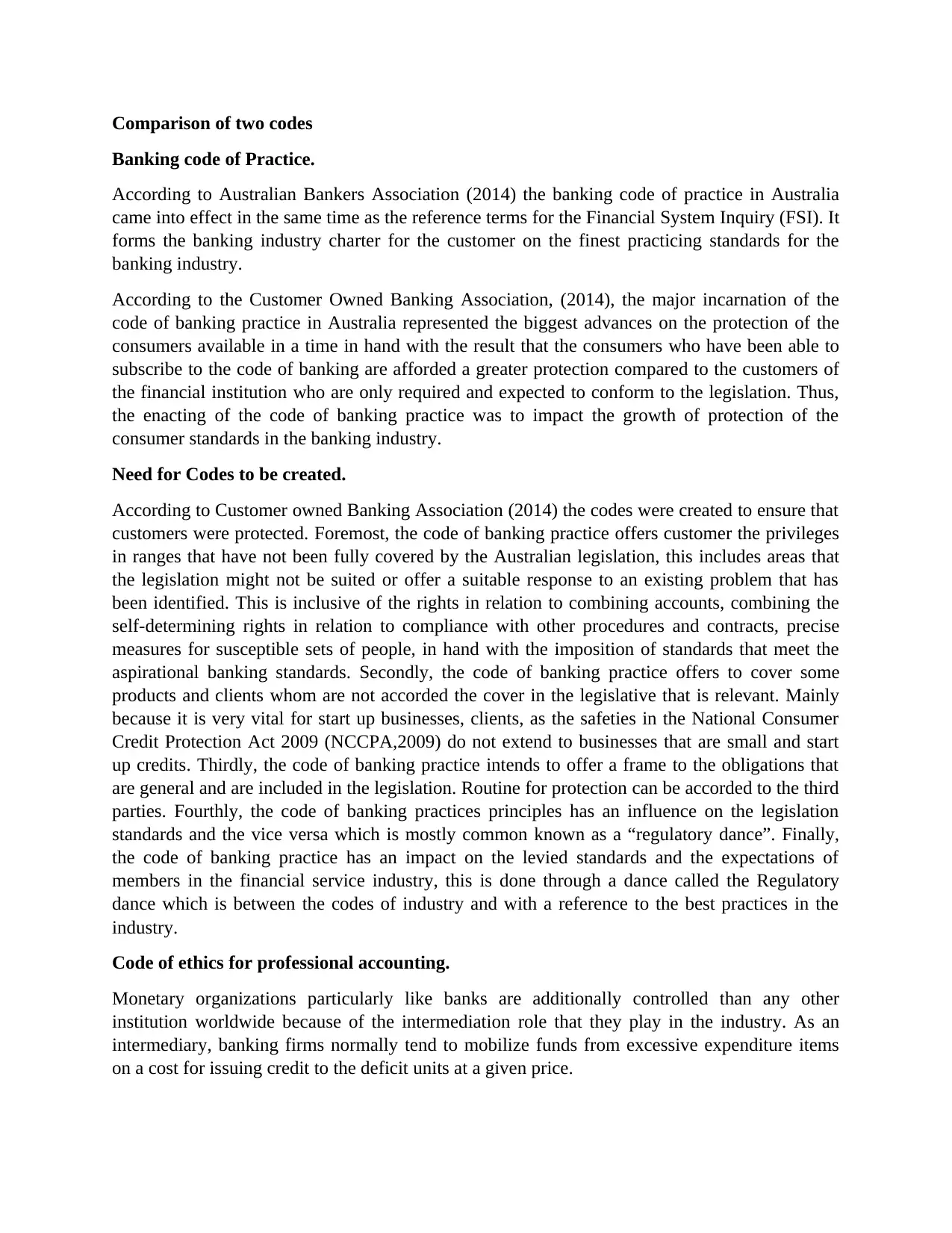
Comparison of two codes
Banking code of Practice.
According to Australian Bankers Association (2014) the banking code of practice in Australia
came into effect in the same time as the reference terms for the Financial System Inquiry (FSI). It
forms the banking industry charter for the customer on the finest practicing standards for the
banking industry.
According to the Customer Owned Banking Association, (2014), the major incarnation of the
code of banking practice in Australia represented the biggest advances on the protection of the
consumers available in a time in hand with the result that the consumers who have been able to
subscribe to the code of banking are afforded a greater protection compared to the customers of
the financial institution who are only required and expected to conform to the legislation. Thus,
the enacting of the code of banking practice was to impact the growth of protection of the
consumer standards in the banking industry.
Need for Codes to be created.
According to Customer owned Banking Association (2014) the codes were created to ensure that
customers were protected. Foremost, the code of banking practice offers customer the privileges
in ranges that have not been fully covered by the Australian legislation, this includes areas that
the legislation might not be suited or offer a suitable response to an existing problem that has
been identified. This is inclusive of the rights in relation to combining accounts, combining the
self-determining rights in relation to compliance with other procedures and contracts, precise
measures for susceptible sets of people, in hand with the imposition of standards that meet the
aspirational banking standards. Secondly, the code of banking practice offers to cover some
products and clients whom are not accorded the cover in the legislative that is relevant. Mainly
because it is very vital for start up businesses, clients, as the safeties in the National Consumer
Credit Protection Act 2009 (NCCPA,2009) do not extend to businesses that are small and start
up credits. Thirdly, the code of banking practice intends to offer a frame to the obligations that
are general and are included in the legislation. Routine for protection can be accorded to the third
parties. Fourthly, the code of banking practices principles has an influence on the legislation
standards and the vice versa which is mostly common known as a “regulatory dance”. Finally,
the code of banking practice has an impact on the levied standards and the expectations of
members in the financial service industry, this is done through a dance called the Regulatory
dance which is between the codes of industry and with a reference to the best practices in the
industry.
Code of ethics for professional accounting.
Monetary organizations particularly like banks are additionally controlled than any other
institution worldwide because of the intermediation role that they play in the industry. As an
intermediary, banking firms normally tend to mobilize funds from excessive expenditure items
on a cost for issuing credit to the deficit units at a given price.
Banking code of Practice.
According to Australian Bankers Association (2014) the banking code of practice in Australia
came into effect in the same time as the reference terms for the Financial System Inquiry (FSI). It
forms the banking industry charter for the customer on the finest practicing standards for the
banking industry.
According to the Customer Owned Banking Association, (2014), the major incarnation of the
code of banking practice in Australia represented the biggest advances on the protection of the
consumers available in a time in hand with the result that the consumers who have been able to
subscribe to the code of banking are afforded a greater protection compared to the customers of
the financial institution who are only required and expected to conform to the legislation. Thus,
the enacting of the code of banking practice was to impact the growth of protection of the
consumer standards in the banking industry.
Need for Codes to be created.
According to Customer owned Banking Association (2014) the codes were created to ensure that
customers were protected. Foremost, the code of banking practice offers customer the privileges
in ranges that have not been fully covered by the Australian legislation, this includes areas that
the legislation might not be suited or offer a suitable response to an existing problem that has
been identified. This is inclusive of the rights in relation to combining accounts, combining the
self-determining rights in relation to compliance with other procedures and contracts, precise
measures for susceptible sets of people, in hand with the imposition of standards that meet the
aspirational banking standards. Secondly, the code of banking practice offers to cover some
products and clients whom are not accorded the cover in the legislative that is relevant. Mainly
because it is very vital for start up businesses, clients, as the safeties in the National Consumer
Credit Protection Act 2009 (NCCPA,2009) do not extend to businesses that are small and start
up credits. Thirdly, the code of banking practice intends to offer a frame to the obligations that
are general and are included in the legislation. Routine for protection can be accorded to the third
parties. Fourthly, the code of banking practices principles has an influence on the legislation
standards and the vice versa which is mostly common known as a “regulatory dance”. Finally,
the code of banking practice has an impact on the levied standards and the expectations of
members in the financial service industry, this is done through a dance called the Regulatory
dance which is between the codes of industry and with a reference to the best practices in the
industry.
Code of ethics for professional accounting.
Monetary organizations particularly like banks are additionally controlled than any other
institution worldwide because of the intermediation role that they play in the industry. As an
intermediary, banking firms normally tend to mobilize funds from excessive expenditure items
on a cost for issuing credit to the deficit units at a given price.
Paraphrase This Document
Need a fresh take? Get an instant paraphrase of this document with our AI Paraphraser
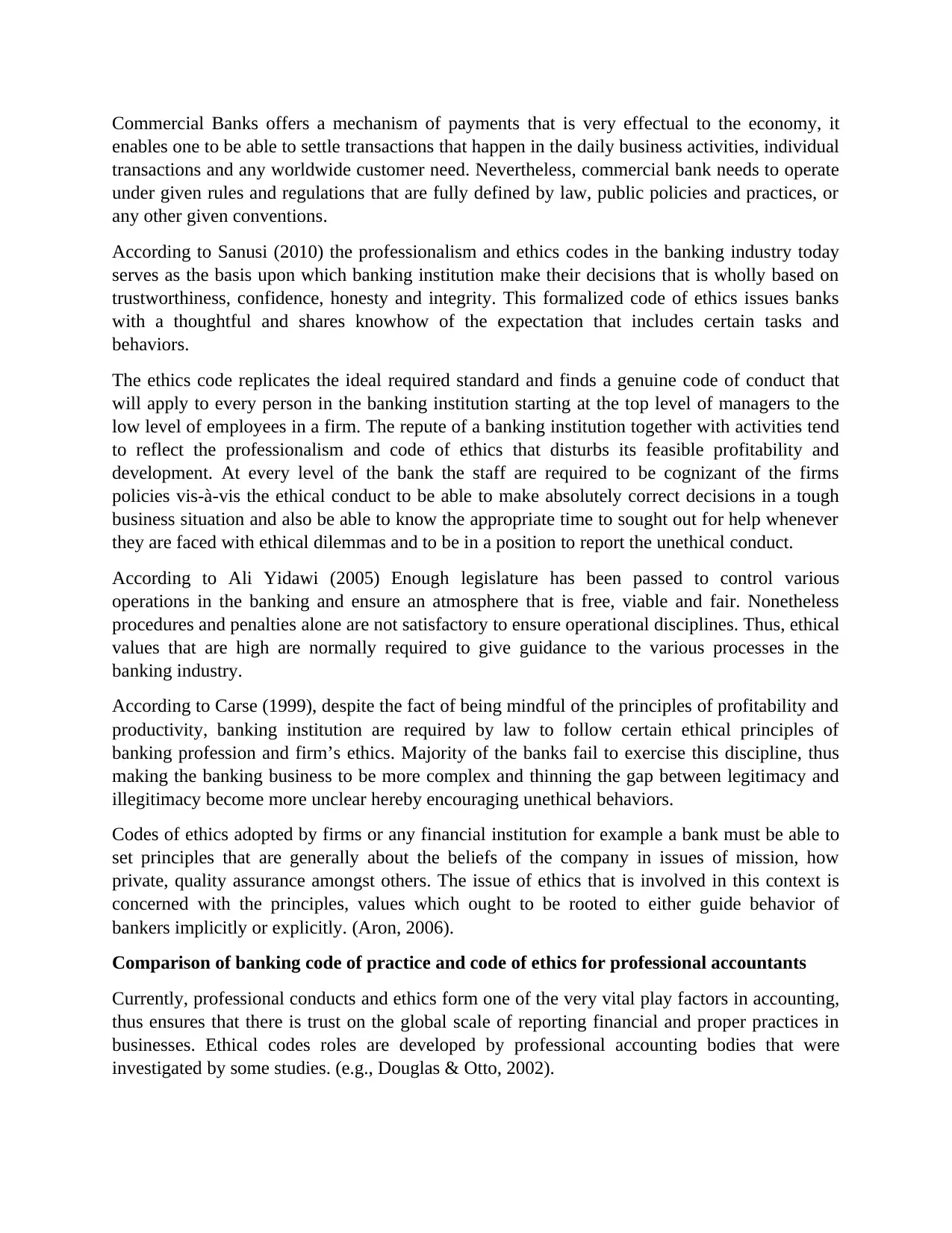
Commercial Banks offers a mechanism of payments that is very effectual to the economy, it
enables one to be able to settle transactions that happen in the daily business activities, individual
transactions and any worldwide customer need. Nevertheless, commercial bank needs to operate
under given rules and regulations that are fully defined by law, public policies and practices, or
any other given conventions.
According to Sanusi (2010) the professionalism and ethics codes in the banking industry today
serves as the basis upon which banking institution make their decisions that is wholly based on
trustworthiness, confidence, honesty and integrity. This formalized code of ethics issues banks
with a thoughtful and shares knowhow of the expectation that includes certain tasks and
behaviors.
The ethics code replicates the ideal required standard and finds a genuine code of conduct that
will apply to every person in the banking institution starting at the top level of managers to the
low level of employees in a firm. The repute of a banking institution together with activities tend
to reflect the professionalism and code of ethics that disturbs its feasible profitability and
development. At every level of the bank the staff are required to be cognizant of the firms
policies vis-à-vis the ethical conduct to be able to make absolutely correct decisions in a tough
business situation and also be able to know the appropriate time to sought out for help whenever
they are faced with ethical dilemmas and to be in a position to report the unethical conduct.
According to Ali Yidawi (2005) Enough legislature has been passed to control various
operations in the banking and ensure an atmosphere that is free, viable and fair. Nonetheless
procedures and penalties alone are not satisfactory to ensure operational disciplines. Thus, ethical
values that are high are normally required to give guidance to the various processes in the
banking industry.
According to Carse (1999), despite the fact of being mindful of the principles of profitability and
productivity, banking institution are required by law to follow certain ethical principles of
banking profession and firm’s ethics. Majority of the banks fail to exercise this discipline, thus
making the banking business to be more complex and thinning the gap between legitimacy and
illegitimacy become more unclear hereby encouraging unethical behaviors.
Codes of ethics adopted by firms or any financial institution for example a bank must be able to
set principles that are generally about the beliefs of the company in issues of mission, how
private, quality assurance amongst others. The issue of ethics that is involved in this context is
concerned with the principles, values which ought to be rooted to either guide behavior of
bankers implicitly or explicitly. (Aron, 2006).
Comparison of banking code of practice and code of ethics for professional accountants
Currently, professional conducts and ethics form one of the very vital play factors in accounting,
thus ensures that there is trust on the global scale of reporting financial and proper practices in
businesses. Ethical codes roles are developed by professional accounting bodies that were
investigated by some studies. (e.g., Douglas & Otto, 2002).
enables one to be able to settle transactions that happen in the daily business activities, individual
transactions and any worldwide customer need. Nevertheless, commercial bank needs to operate
under given rules and regulations that are fully defined by law, public policies and practices, or
any other given conventions.
According to Sanusi (2010) the professionalism and ethics codes in the banking industry today
serves as the basis upon which banking institution make their decisions that is wholly based on
trustworthiness, confidence, honesty and integrity. This formalized code of ethics issues banks
with a thoughtful and shares knowhow of the expectation that includes certain tasks and
behaviors.
The ethics code replicates the ideal required standard and finds a genuine code of conduct that
will apply to every person in the banking institution starting at the top level of managers to the
low level of employees in a firm. The repute of a banking institution together with activities tend
to reflect the professionalism and code of ethics that disturbs its feasible profitability and
development. At every level of the bank the staff are required to be cognizant of the firms
policies vis-à-vis the ethical conduct to be able to make absolutely correct decisions in a tough
business situation and also be able to know the appropriate time to sought out for help whenever
they are faced with ethical dilemmas and to be in a position to report the unethical conduct.
According to Ali Yidawi (2005) Enough legislature has been passed to control various
operations in the banking and ensure an atmosphere that is free, viable and fair. Nonetheless
procedures and penalties alone are not satisfactory to ensure operational disciplines. Thus, ethical
values that are high are normally required to give guidance to the various processes in the
banking industry.
According to Carse (1999), despite the fact of being mindful of the principles of profitability and
productivity, banking institution are required by law to follow certain ethical principles of
banking profession and firm’s ethics. Majority of the banks fail to exercise this discipline, thus
making the banking business to be more complex and thinning the gap between legitimacy and
illegitimacy become more unclear hereby encouraging unethical behaviors.
Codes of ethics adopted by firms or any financial institution for example a bank must be able to
set principles that are generally about the beliefs of the company in issues of mission, how
private, quality assurance amongst others. The issue of ethics that is involved in this context is
concerned with the principles, values which ought to be rooted to either guide behavior of
bankers implicitly or explicitly. (Aron, 2006).
Comparison of banking code of practice and code of ethics for professional accountants
Currently, professional conducts and ethics form one of the very vital play factors in accounting,
thus ensures that there is trust on the global scale of reporting financial and proper practices in
businesses. Ethical codes roles are developed by professional accounting bodies that were
investigated by some studies. (e.g., Douglas & Otto, 2002).
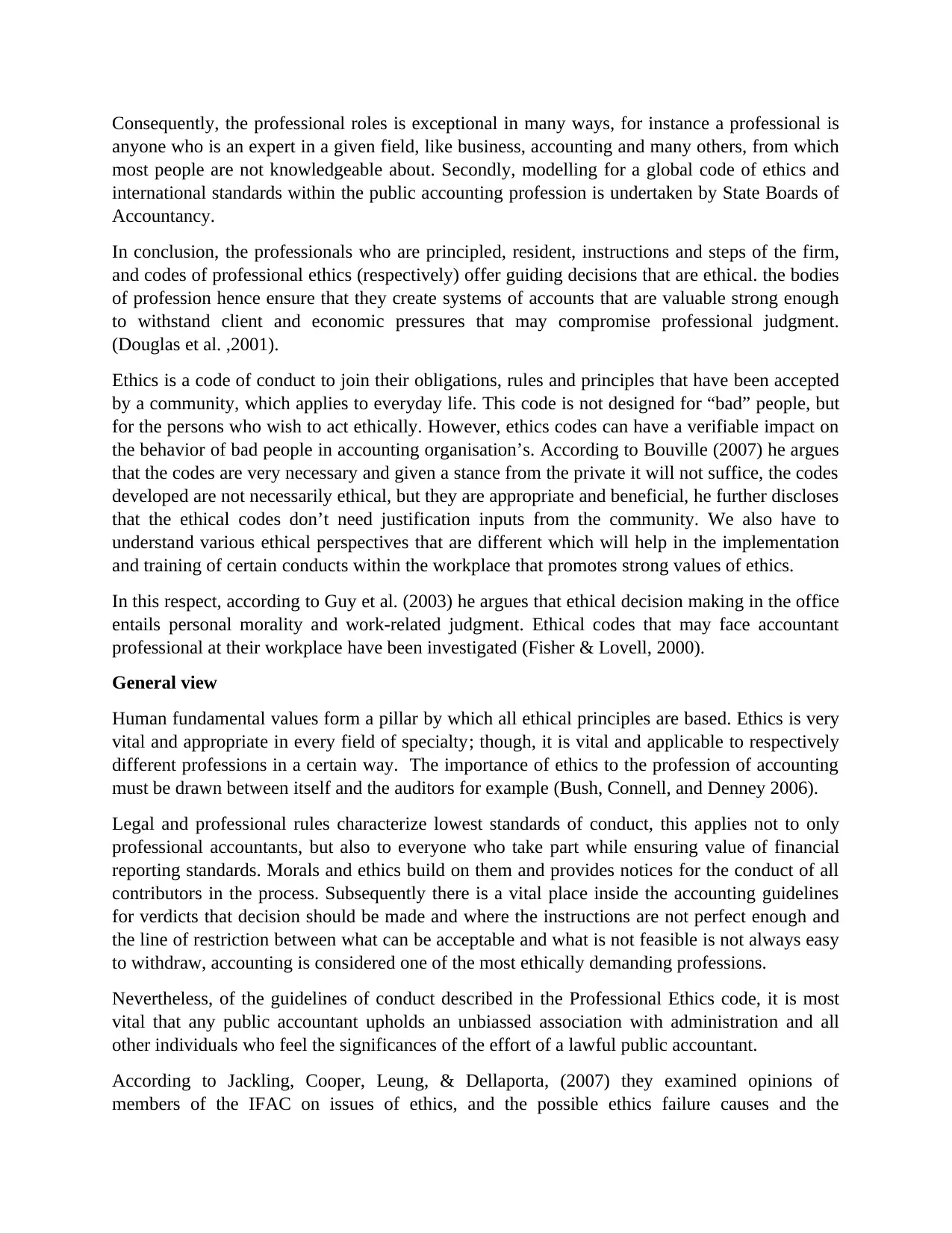
Consequently, the professional roles is exceptional in many ways, for instance a professional is
anyone who is an expert in a given field, like business, accounting and many others, from which
most people are not knowledgeable about. Secondly, modelling for a global code of ethics and
international standards within the public accounting profession is undertaken by State Boards of
Accountancy.
In conclusion, the professionals who are principled, resident, instructions and steps of the firm,
and codes of professional ethics (respectively) offer guiding decisions that are ethical. the bodies
of profession hence ensure that they create systems of accounts that are valuable strong enough
to withstand client and economic pressures that may compromise professional judgment.
(Douglas et al. ,2001).
Ethics is a code of conduct to join their obligations, rules and principles that have been accepted
by a community, which applies to everyday life. This code is not designed for “bad” people, but
for the persons who wish to act ethically. However, ethics codes can have a verifiable impact on
the behavior of bad people in accounting organisation’s. According to Bouville (2007) he argues
that the codes are very necessary and given a stance from the private it will not suffice, the codes
developed are not necessarily ethical, but they are appropriate and beneficial, he further discloses
that the ethical codes don’t need justification inputs from the community. We also have to
understand various ethical perspectives that are different which will help in the implementation
and training of certain conducts within the workplace that promotes strong values of ethics.
In this respect, according to Guy et al. (2003) he argues that ethical decision making in the office
entails personal morality and work-related judgment. Ethical codes that may face accountant
professional at their workplace have been investigated (Fisher & Lovell, 2000).
General view
Human fundamental values form a pillar by which all ethical principles are based. Ethics is very
vital and appropriate in every field of specialty; though, it is vital and applicable to respectively
different professions in a certain way. The importance of ethics to the profession of accounting
must be drawn between itself and the auditors for example (Bush, Connell, and Denney 2006).
Legal and professional rules characterize lowest standards of conduct, this applies not to only
professional accountants, but also to everyone who take part while ensuring value of financial
reporting standards. Morals and ethics build on them and provides notices for the conduct of all
contributors in the process. Subsequently there is a vital place inside the accounting guidelines
for verdicts that decision should be made and where the instructions are not perfect enough and
the line of restriction between what can be acceptable and what is not feasible is not always easy
to withdraw, accounting is considered one of the most ethically demanding professions.
Nevertheless, of the guidelines of conduct described in the Professional Ethics code, it is most
vital that any public accountant upholds an unbiassed association with administration and all
other individuals who feel the significances of the effort of a lawful public accountant.
According to Jackling, Cooper, Leung, & Dellaporta, (2007) they examined opinions of
members of the IFAC on issues of ethics, and the possible ethics failure causes and the
anyone who is an expert in a given field, like business, accounting and many others, from which
most people are not knowledgeable about. Secondly, modelling for a global code of ethics and
international standards within the public accounting profession is undertaken by State Boards of
Accountancy.
In conclusion, the professionals who are principled, resident, instructions and steps of the firm,
and codes of professional ethics (respectively) offer guiding decisions that are ethical. the bodies
of profession hence ensure that they create systems of accounts that are valuable strong enough
to withstand client and economic pressures that may compromise professional judgment.
(Douglas et al. ,2001).
Ethics is a code of conduct to join their obligations, rules and principles that have been accepted
by a community, which applies to everyday life. This code is not designed for “bad” people, but
for the persons who wish to act ethically. However, ethics codes can have a verifiable impact on
the behavior of bad people in accounting organisation’s. According to Bouville (2007) he argues
that the codes are very necessary and given a stance from the private it will not suffice, the codes
developed are not necessarily ethical, but they are appropriate and beneficial, he further discloses
that the ethical codes don’t need justification inputs from the community. We also have to
understand various ethical perspectives that are different which will help in the implementation
and training of certain conducts within the workplace that promotes strong values of ethics.
In this respect, according to Guy et al. (2003) he argues that ethical decision making in the office
entails personal morality and work-related judgment. Ethical codes that may face accountant
professional at their workplace have been investigated (Fisher & Lovell, 2000).
General view
Human fundamental values form a pillar by which all ethical principles are based. Ethics is very
vital and appropriate in every field of specialty; though, it is vital and applicable to respectively
different professions in a certain way. The importance of ethics to the profession of accounting
must be drawn between itself and the auditors for example (Bush, Connell, and Denney 2006).
Legal and professional rules characterize lowest standards of conduct, this applies not to only
professional accountants, but also to everyone who take part while ensuring value of financial
reporting standards. Morals and ethics build on them and provides notices for the conduct of all
contributors in the process. Subsequently there is a vital place inside the accounting guidelines
for verdicts that decision should be made and where the instructions are not perfect enough and
the line of restriction between what can be acceptable and what is not feasible is not always easy
to withdraw, accounting is considered one of the most ethically demanding professions.
Nevertheless, of the guidelines of conduct described in the Professional Ethics code, it is most
vital that any public accountant upholds an unbiassed association with administration and all
other individuals who feel the significances of the effort of a lawful public accountant.
According to Jackling, Cooper, Leung, & Dellaporta, (2007) they examined opinions of
members of the IFAC on issues of ethics, and the possible ethics failure causes and the
⊘ This is a preview!⊘
Do you want full access?
Subscribe today to unlock all pages.

Trusted by 1+ million students worldwide
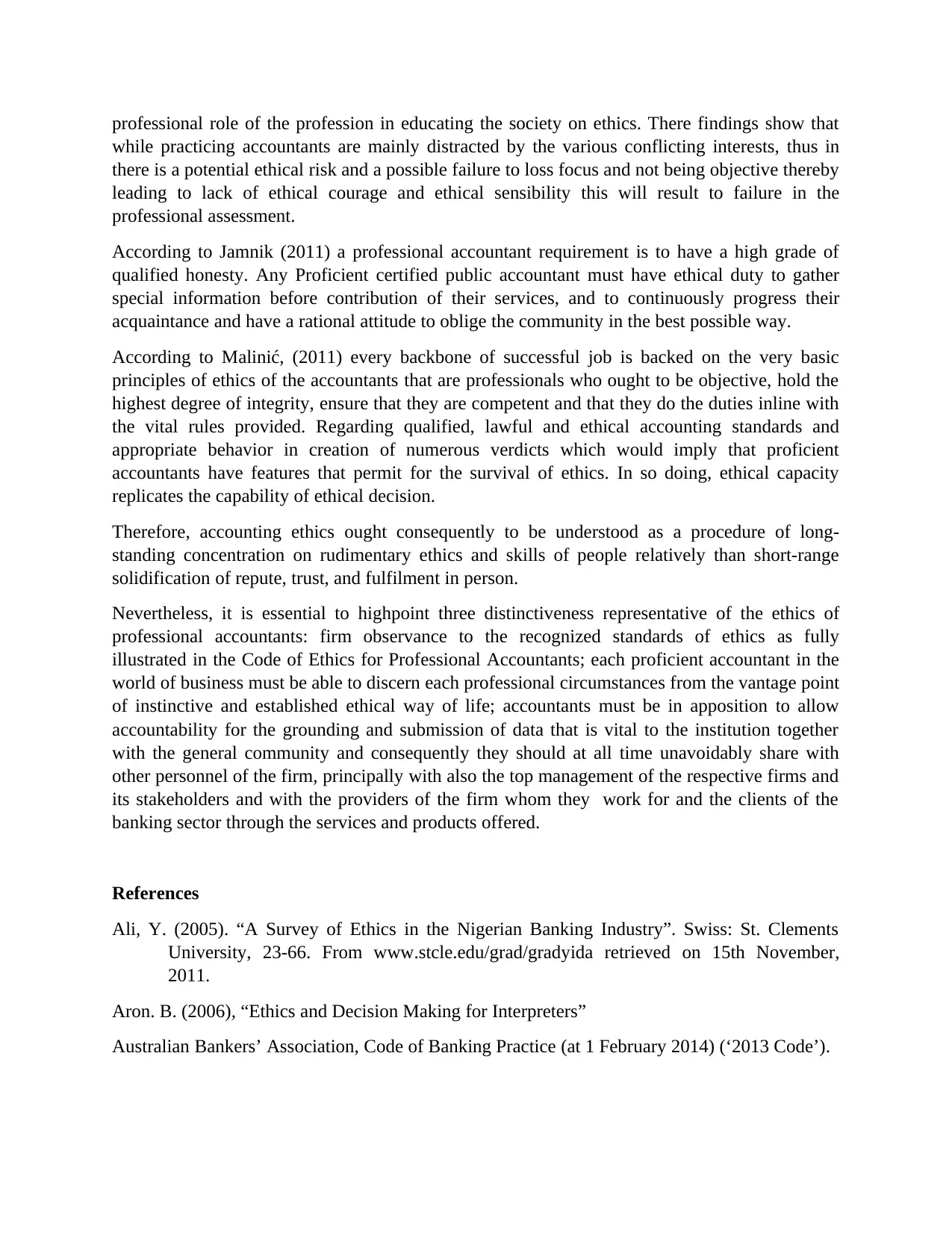
professional role of the profession in educating the society on ethics. There findings show that
while practicing accountants are mainly distracted by the various conflicting interests, thus in
there is a potential ethical risk and a possible failure to loss focus and not being objective thereby
leading to lack of ethical courage and ethical sensibility this will result to failure in the
professional assessment.
According to Jamnik (2011) a professional accountant requirement is to have a high grade of
qualified honesty. Any Proficient certified public accountant must have ethical duty to gather
special information before contribution of their services, and to continuously progress their
acquaintance and have a rational attitude to oblige the community in the best possible way.
According to Malinić, (2011) every backbone of successful job is backed on the very basic
principles of ethics of the accountants that are professionals who ought to be objective, hold the
highest degree of integrity, ensure that they are competent and that they do the duties inline with
the vital rules provided. Regarding qualified, lawful and ethical accounting standards and
appropriate behavior in creation of numerous verdicts which would imply that proficient
accountants have features that permit for the survival of ethics. In so doing, ethical capacity
replicates the capability of ethical decision.
Therefore, accounting ethics ought consequently to be understood as a procedure of long-
standing concentration on rudimentary ethics and skills of people relatively than short-range
solidification of repute, trust, and fulfilment in person.
Nevertheless, it is essential to highpoint three distinctiveness representative of the ethics of
professional accountants: firm observance to the recognized standards of ethics as fully
illustrated in the Code of Ethics for Professional Accountants; each proficient accountant in the
world of business must be able to discern each professional circumstances from the vantage point
of instinctive and established ethical way of life; accountants must be in apposition to allow
accountability for the grounding and submission of data that is vital to the institution together
with the general community and consequently they should at all time unavoidably share with
other personnel of the firm, principally with also the top management of the respective firms and
its stakeholders and with the providers of the firm whom they work for and the clients of the
banking sector through the services and products offered.
References
Ali, Y. (2005). “A Survey of Ethics in the Nigerian Banking Industry”. Swiss: St. Clements
University, 23-66. From www.stcle.edu/grad/gradyida retrieved on 15th November,
2011.
Aron. B. (2006), “Ethics and Decision Making for Interpreters”
Australian Bankers’ Association, Code of Banking Practice (at 1 February 2014) (‘2013 Code’).
while practicing accountants are mainly distracted by the various conflicting interests, thus in
there is a potential ethical risk and a possible failure to loss focus and not being objective thereby
leading to lack of ethical courage and ethical sensibility this will result to failure in the
professional assessment.
According to Jamnik (2011) a professional accountant requirement is to have a high grade of
qualified honesty. Any Proficient certified public accountant must have ethical duty to gather
special information before contribution of their services, and to continuously progress their
acquaintance and have a rational attitude to oblige the community in the best possible way.
According to Malinić, (2011) every backbone of successful job is backed on the very basic
principles of ethics of the accountants that are professionals who ought to be objective, hold the
highest degree of integrity, ensure that they are competent and that they do the duties inline with
the vital rules provided. Regarding qualified, lawful and ethical accounting standards and
appropriate behavior in creation of numerous verdicts which would imply that proficient
accountants have features that permit for the survival of ethics. In so doing, ethical capacity
replicates the capability of ethical decision.
Therefore, accounting ethics ought consequently to be understood as a procedure of long-
standing concentration on rudimentary ethics and skills of people relatively than short-range
solidification of repute, trust, and fulfilment in person.
Nevertheless, it is essential to highpoint three distinctiveness representative of the ethics of
professional accountants: firm observance to the recognized standards of ethics as fully
illustrated in the Code of Ethics for Professional Accountants; each proficient accountant in the
world of business must be able to discern each professional circumstances from the vantage point
of instinctive and established ethical way of life; accountants must be in apposition to allow
accountability for the grounding and submission of data that is vital to the institution together
with the general community and consequently they should at all time unavoidably share with
other personnel of the firm, principally with also the top management of the respective firms and
its stakeholders and with the providers of the firm whom they work for and the clients of the
banking sector through the services and products offered.
References
Ali, Y. (2005). “A Survey of Ethics in the Nigerian Banking Industry”. Swiss: St. Clements
University, 23-66. From www.stcle.edu/grad/gradyida retrieved on 15th November,
2011.
Aron. B. (2006), “Ethics and Decision Making for Interpreters”
Australian Bankers’ Association, Code of Banking Practice (at 1 February 2014) (‘2013 Code’).
Paraphrase This Document
Need a fresh take? Get an instant paraphrase of this document with our AI Paraphraser
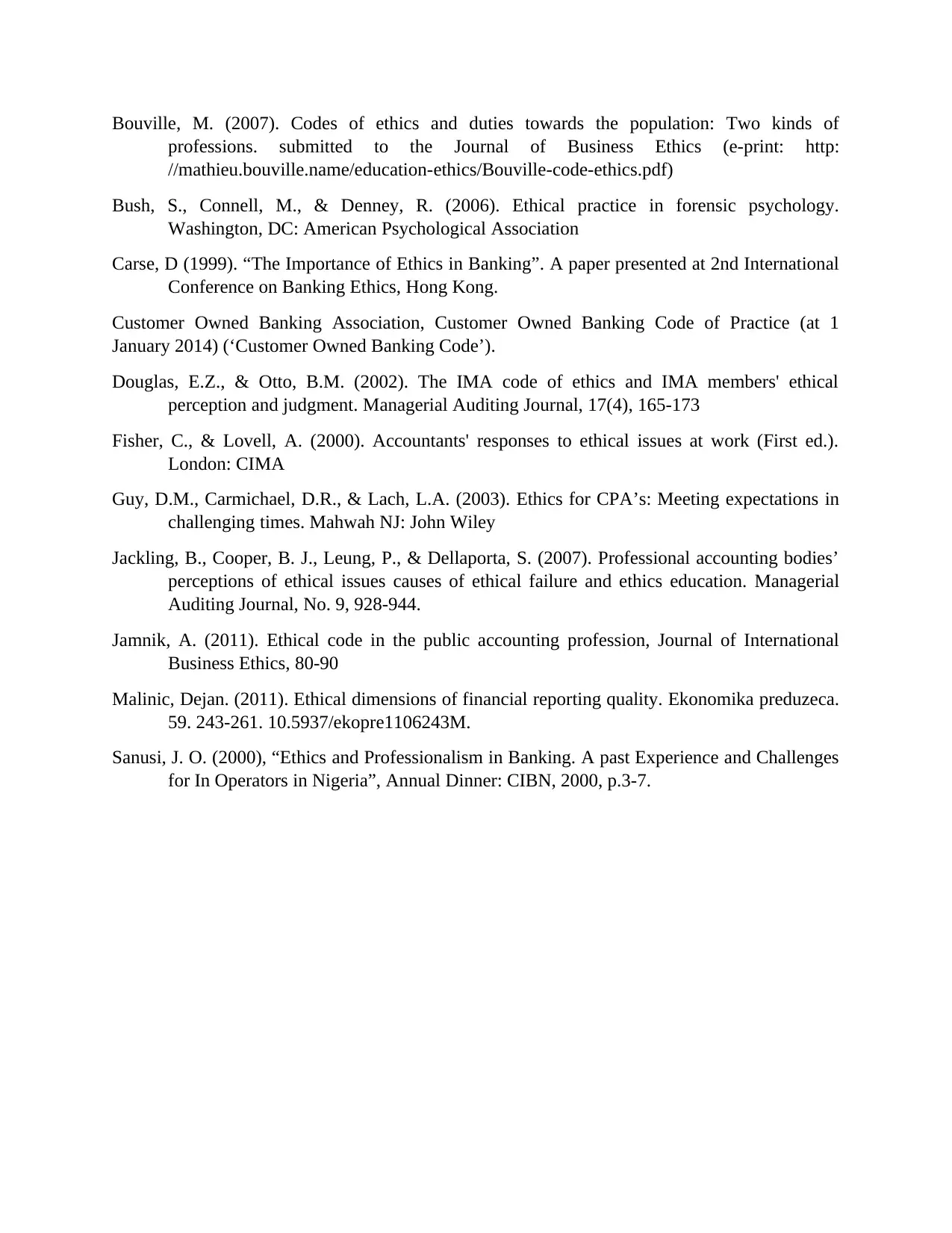
Bouville, M. (2007). Codes of ethics and duties towards the population: Two kinds of
professions. submitted to the Journal of Business Ethics (e-print: http:
//mathieu.bouville.name/education-ethics/Bouville-code-ethics.pdf)
Bush, S., Connell, M., & Denney, R. (2006). Ethical practice in forensic psychology.
Washington, DC: American Psychological Association
Carse, D (1999). “The Importance of Ethics in Banking”. A paper presented at 2nd International
Conference on Banking Ethics, Hong Kong.
Customer Owned Banking Association, Customer Owned Banking Code of Practice (at 1
January 2014) (‘Customer Owned Banking Code’).
Douglas, E.Z., & Otto, B.M. (2002). The IMA code of ethics and IMA members' ethical
perception and judgment. Managerial Auditing Journal, 17(4), 165-173
Fisher, C., & Lovell, A. (2000). Accountants' responses to ethical issues at work (First ed.).
London: CIMA
Guy, D.M., Carmichael, D.R., & Lach, L.A. (2003). Ethics for CPA’s: Meeting expectations in
challenging times. Mahwah NJ: John Wiley
Jackling, B., Cooper, B. J., Leung, P., & Dellaporta, S. (2007). Professional accounting bodies’
perceptions of ethical issues causes of ethical failure and ethics education. Managerial
Auditing Journal, No. 9, 928-944.
Jamnik, A. (2011). Ethical code in the public accounting profession, Journal of International
Business Ethics, 80-90
Malinic, Dejan. (2011). Ethical dimensions of financial reporting quality. Ekonomika preduzeca.
59. 243-261. 10.5937/ekopre1106243M.
Sanusi, J. O. (2000), “Ethics and Professionalism in Banking. A past Experience and Challenges
for In Operators in Nigeria”, Annual Dinner: CIBN, 2000, p.3-7.
professions. submitted to the Journal of Business Ethics (e-print: http:
//mathieu.bouville.name/education-ethics/Bouville-code-ethics.pdf)
Bush, S., Connell, M., & Denney, R. (2006). Ethical practice in forensic psychology.
Washington, DC: American Psychological Association
Carse, D (1999). “The Importance of Ethics in Banking”. A paper presented at 2nd International
Conference on Banking Ethics, Hong Kong.
Customer Owned Banking Association, Customer Owned Banking Code of Practice (at 1
January 2014) (‘Customer Owned Banking Code’).
Douglas, E.Z., & Otto, B.M. (2002). The IMA code of ethics and IMA members' ethical
perception and judgment. Managerial Auditing Journal, 17(4), 165-173
Fisher, C., & Lovell, A. (2000). Accountants' responses to ethical issues at work (First ed.).
London: CIMA
Guy, D.M., Carmichael, D.R., & Lach, L.A. (2003). Ethics for CPA’s: Meeting expectations in
challenging times. Mahwah NJ: John Wiley
Jackling, B., Cooper, B. J., Leung, P., & Dellaporta, S. (2007). Professional accounting bodies’
perceptions of ethical issues causes of ethical failure and ethics education. Managerial
Auditing Journal, No. 9, 928-944.
Jamnik, A. (2011). Ethical code in the public accounting profession, Journal of International
Business Ethics, 80-90
Malinic, Dejan. (2011). Ethical dimensions of financial reporting quality. Ekonomika preduzeca.
59. 243-261. 10.5937/ekopre1106243M.
Sanusi, J. O. (2000), “Ethics and Professionalism in Banking. A past Experience and Challenges
for In Operators in Nigeria”, Annual Dinner: CIBN, 2000, p.3-7.
1 out of 5
Related Documents
Your All-in-One AI-Powered Toolkit for Academic Success.
+13062052269
info@desklib.com
Available 24*7 on WhatsApp / Email
![[object Object]](/_next/static/media/star-bottom.7253800d.svg)
Unlock your academic potential
Copyright © 2020–2026 A2Z Services. All Rights Reserved. Developed and managed by ZUCOL.





